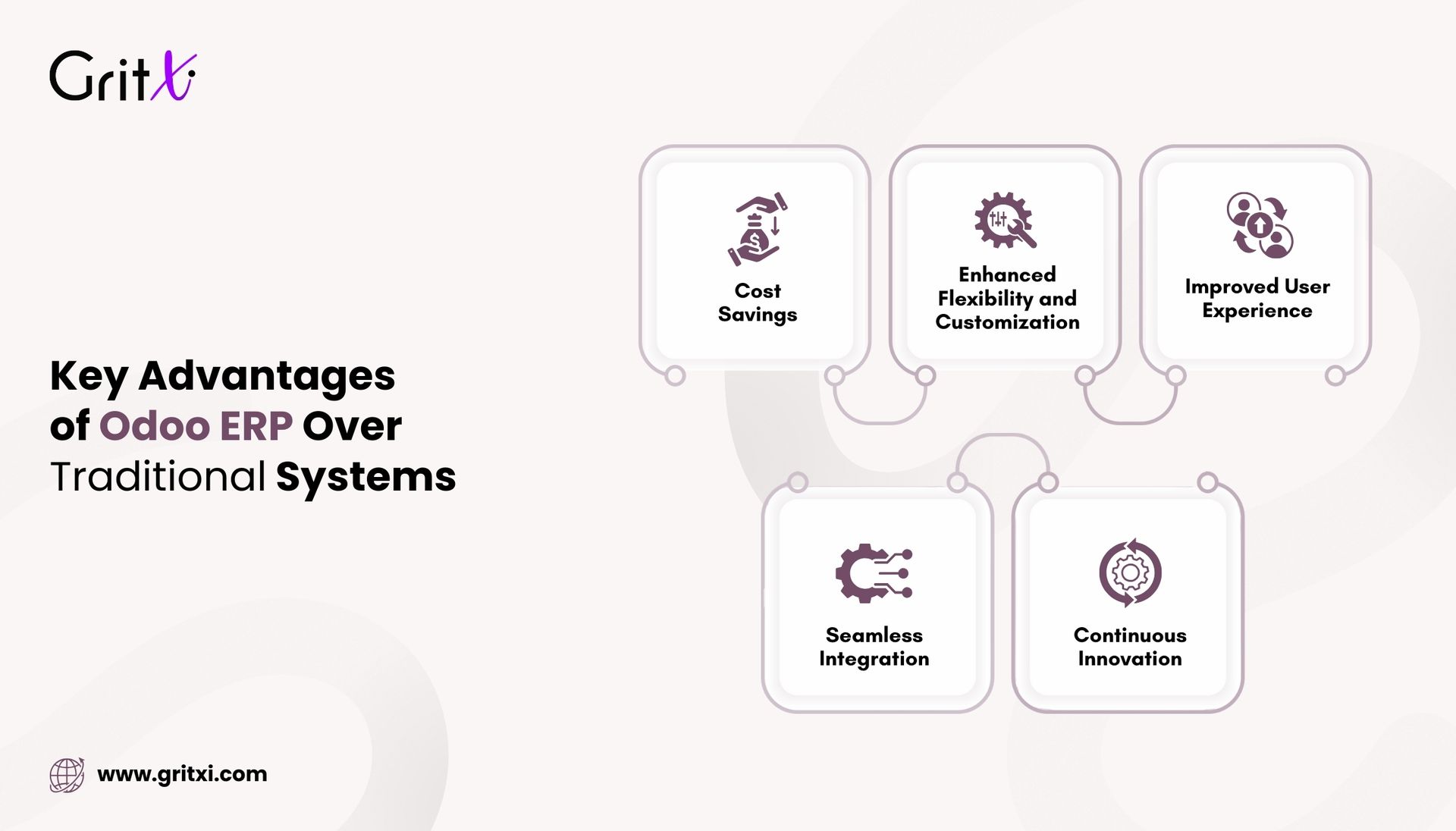Modern businesses require efficient and integrated operations to succeed. To thrive, businesses need integrated systems that streamline operations, improve decision-making, and foster growth. Enter Enterprise Resource Planning (ERP) systems, software solutions that integrate various business functions, from finance and accounting to sales, marketing, and human resources.
While traditional ERP systems have long dominated the market, a newer breed of solutions is emerging, offering enhanced flexibility, affordability, and user-friendliness. One such prominent contender is Odoo ERP, a powerful and versatile open-source platform gaining significant traction. This article will explore the key differences between Odoo ERP and traditional ERP systems, highlighting why Odoo often emerges as a superior choice for modern businesses.
Understanding Traditional ERP Systems
Traditional ERP systems are typically characterized by:
- High upfront costs: Licensing fees and implementation costs can be substantial, often requiring significant upfront investments.
- Complexity and rigidity: These systems are often complex to implement and require extensive IT expertise. Customization options are limited, making it difficult to adapt to specific business needs.
- Long implementation timelines: Deploying a traditional ERP system can be a lengthy and time-consuming process, often requiring months or even years.
- Vendor lock-in: Businesses can become locked into long-term contracts with vendors, limiting their flexibility and increasing costs.
The Rise of Odoo ERP: A Modern Approach
Odoo ERP stands out from traditional systems by offering a more modern, flexible, and user-friendly approach:
- Modular Architecture: Unlike monolithic traditional systems, Odoo is built on a modular architecture. This allows businesses to select and implement only the modules they need, such as sales, inventory, accounting, CRM, and manufacturing. This "build-your-own" approach significantly reduces implementation costs and complexity.
- Open-Source Foundation: As open-source software, Odoo provides unparalleled flexibility and customization. Businesses can modify the system to fit their specific requirements, integrate with other tools, and even develop custom modules to address unique needs.
- User-Friendliness: Odoo boasts an intuitive and user-friendly interface, making it easy for employees across different departments to learn and adopt the system. This reduces the need for extensive training and minimizes user resistance.
- Cost-Effectiveness: Odoo offers a more affordable alternative to traditional ERP systems. The community edition is free to use, and the enterprise edition provides a cost-effective solution with a pay-as-you-go model. This makes it an attractive option for businesses of all sizes, particularly SMEs with limited budgets.
- Scalability and Flexibility: Odoo can easily scale to accommodate the growth of your business. As your company expands, you can seamlessly add new modules and features without disrupting your operations.

Key Advantages of Odoo ERP Over Traditional Systems
1. Cost Savings:
- Lower upfront investment: The modular approach and availability of a free community edition significantly reduce initial costs.
- Pay-as-you-grow model: Businesses only pay for the modules they need, minimizing upfront expenses and optimizing costs as they expand.
- Reduced IT overhead: Odoo's user-friendliness minimizes the need for extensive IT support and training, leading to lower overall IT costs.
2. Enhanced Flexibility and Customization:
- Modular architecture: Businesses can choose from a wide range of modules, allowing for a tailored solution that perfectly aligns with their specific business processes.
- Open-source nature: This empowers businesses to customize the system to their exact specifications, adapting it to unique workflows and industry-specific requirements.
- Active community: The large and active Odoo community provides access to a wealth of resources, including custom modules, support forums, and expert advice.
3. Improved User Experience:
- Intuitive interface: Odoo's user-friendly interface is designed to be easy to navigate and use, even for non-technical users. This increases user adoption and minimizes training time.
- Faster implementation: The modular structure and ease of use contribute to significantly faster implementation times compared to traditional ERP systems, allowing businesses to quickly realize the benefits of their investment.
4. Seamless Integration:
- Integrations with third-party applications: Odoo seamlessly integrates with a wide range of third-party applications, including e-commerce platforms, payment gateways, and marketing automation tools. This enables businesses to leverage existing technologies and create a more connected ecosystem.
- Robust API access: Odoo provides robust API access, enabling businesses to integrate the system with custom applications and build bespoke solutions.
5. Continuous Innovation:
- Regular updates and improvements: Odoo is constantly being updated with new features, improvements, and security patches, ensuring that businesses always have access to the latest technology and remain competitive.
Odoo ERP: A Modern Solution for Modern Businesses
In today's dynamic business environment, businesses need agile and adaptable solutions to thrive. Traditional ERP systems, with their high costs, complexity, and limited flexibility, often fall short in meeting these demands. Odoo ERP, with its modular architecture, open-source nature, and user-friendly interface, offers a compelling alternative. By embracing Odoo, businesses can:
- Reduce costs: Significantly lower upfront and ongoing costs associated with ERP implementation and maintenance.
- Increase efficiency: Streamline business processes, improve data accuracy, and enhance overall operational efficiency.
- Gain a competitive advantage: Achieve greater agility, flexibility, and responsiveness to market changes.
- Improve decision-making: Access real-time data and gain valuable insights to make informed business decisions.
- Foster growth: Support business growth and scalability by easily adding new modules and adapting to changing needs.
Conclusion
Odoo ERP represents a significant shift in the ERP landscape. Its modern approach, coupled with its affordability, flexibility, and user-friendliness, makes it an ideal choice for businesses of all sizes seeking to streamline operations, improve efficiency, and gain a competitive edge. By embracing Odoo, businesses can unlock their full potential and thrive in today's rapidly evolving business world
Odoo ERP vs. Traditional ERP: Why Odoo Is Better Than Other ERP Systems